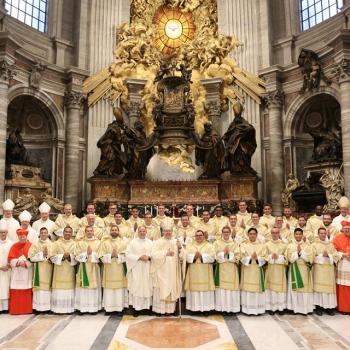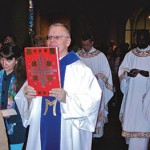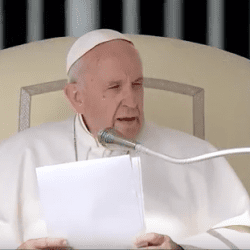A longtime FOB (Friend of the Bench) and FOD (Friend of Deacons) has just published a very good book on one of the most challenging aspects of the Christian life: forgiveness.
Fr. R. Scott Hurd, from the Archdiocese of Washington, serves as the executive director of the archdiocese’s Office of the Permanent Diaconate. (The Father is also a father: he’s a former Episcopal priest who converted in 1996.)
The Catholic Standard has a more:
In his new book “Forgiveness: A Catholic Approach,” Father R. Scott Hurd encourages Catholics to follow Christ’s example and teaching of forgiving others.”Forgiveness is such a central element in our Lord’s teaching. I found myself preaching on this topic very often,” said the priest, explaining the inspiration for the book, his first.
“As always, Jesus shows us the way,” Father Hurd writes in the first chapter, noting how Jesus was betrayed by a friend, abandoned by those whom he loved, and condemned, tortured and ultimately executed on the cross, and still bears the marks of his suffering on his hands, feet and side. “Yet, it is he who calls us to forgive and who gives us the grace to do it,” the priest writes, adding, “He shows us that forgiveness is not only possible, but that it is a necessity for those who would follow him.”
The 128-page paperback book, published this month by Pauline Books and Media, has 24 short chapters, with many including stories of how real-life Catholics, in contemporary times and in ages past, were moved by God’s grace to forgive others. Those examples include Steven McDonald, a New York City police officer who forgave the young man who shot him three times in 1986, causing him to be paralyzed; and Bud Welch, who forgave the men responsible for the 1995 Oklahoma City federal building bombings that killed his daughter and 167 others. Father Hurd also writes about Dativa Nyangezi Ngaboyisonga, a Rwandan woman who witnessed the murder of her father and aunt during the ethnic slaughter between the Hutus and Tutsis in 1994, and who has dedicated her life to promoting reconciliation in her country, where, the priest notes, “there are entire villages in Rwanda where killers and victims’ families (now) live side by side in peace.”
The book also includes examples of saints, like St. John of the Cross and St. Jane de Chantal, who experienced God’s mercy in their own lives and who inspired others to forgive. “They show us it (forgiveness) is possible,” Father Hurd said in an interview.
Forgiveness, the priest said, “is an act of love, and it can also be an act of evangelization. We can show the world the power of forgiveness, which is a manifestation of a loving and forgiving God.” That point is echoed in the book’s introduction by Washington Cardinal Donald Wuerl, who notes that forgiveness offers people an opportunity to share the Good News. “As participants in the New Evangelization, our acts of forgiveness and reconciliation offer people an experience of God’s love,” writes the cardinal, who then quotes Father Hurd’s point that “forgiveness from our hearts can turn others’ hearts toward God.”
Meantime, Fr. Hurd has more on the subject of forgiveness, and 9/11, on his blog:
So many wanted to take an eye for an eye after 9/11. Referring to the terrorists, one politician announced: “God may have mercy on you, but we won’t!” That was anger speaking. And it’s normal to feel angry when hurt or attacked. But we can’t that anger harden into bitterness, resentment, or a thirst for revenge. Adding evil to evil is the devil’s work. To bring good out of evil is God’s work, and that’s where we come in. When we forgive, we bring an end to the cycle of violence and hate.
If such forgiveness doesn’t seem fair to us, we’re absolutely right! Forgiveness isn’t fair. An eye-for-an-eye is fair. Strict justice is fair. Through forgiveness, we temper justice with mercy. As has often been said, “Justice is getting what you deserve. Mercy is not getting what you deserve. Grace is getting what you don’t deserve.” By God’s free gift of grace, we’re able to not give to others what they justly deserve, through the mercy of forgiveness.
But does being forgiving people turn us into doormats or punching bags? Does it invite someone to hurt us over and over again? Does it encourage terrorists to strike again? Not at all. Forgiveness doesn’t preclude justice. Blessed Pope John Paul II forgave the gunman who tried to assassinate him. But that gunman remained in prison. Dangerous criminals can be forgiven, and kept off the street at the same time. Terrorists can be forgiven, while we still act to protect our nation, and defend the common good.
By forgiving them, however, we let go of the desire for revenge; by forgiving, we can view them and what they did, not through eyes of hate, but through eyes of love. Just as Jesus sees them- he who begs us to love our enemies. Indeed, it is they who are the very measure of our love. Dorothy Day put it well: “I really only love God, as much as I love the person I love the least.”
There’s much more at the links. And check out his book’s web page, as well. “Forgiveness: A Catholic Approach” should help bring hope and healing to countless people who are struggling to forgive what seems unforgivable. Injustice and heartbreak, tragically, are a part of life. But vengeance need not be. This little book helps point the way to a healthier and holier view of the world, and of those broken souls who inhabit it.
Ultimately, God’s grace, and a heart open to it, can make anything possible. (Deacon tip: not only is Fr. Hurd’s book a treasure trove of sound spiritual advice, it’s also got some great material for homilies!).










